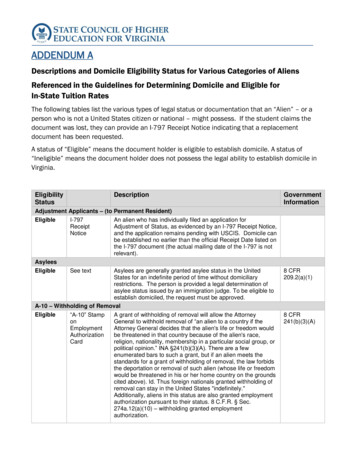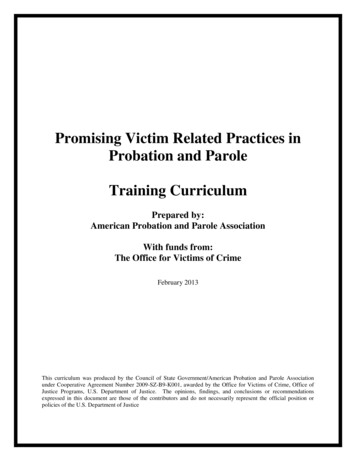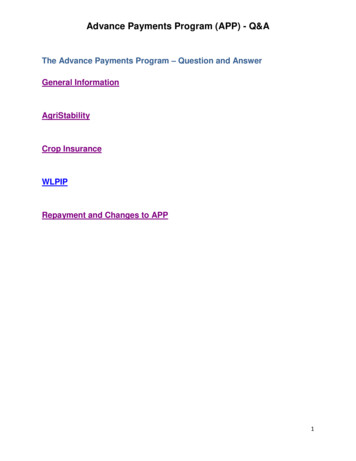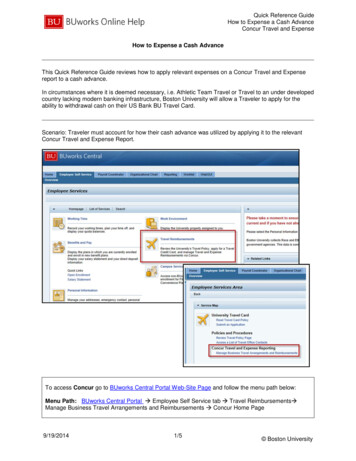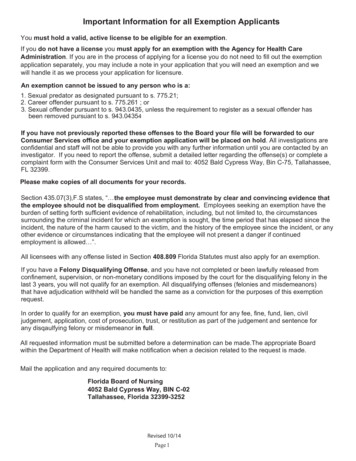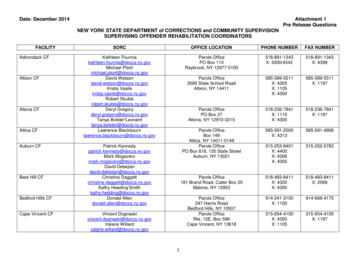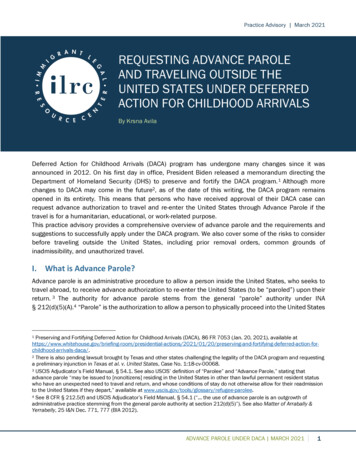
Transcription
Practice Advisory March 2021REQUESTING ADVANCE PAROLEAND TRAVELING OUTSIDE THEUNITED STATES UNDER DEFERREDACTION FOR CHILDHOOD ARRIVALSBy Krsna AvilaDeferred Action for Childhood Arrivals (DACA) program has undergone many changes since it wasannounced in 2012. On his first day in office, President Biden released a memorandum directing theDepartment of Homeland Security (DHS) to preserve and fortify the DACA program. 1 Although morechanges to DACA may come in the future2, as of the date of this writing, the DACA program remainsopened in its entirety. This means that persons who have received approval of their DACA case canrequest advance authorization to travel and re-enter the United States through Advance Parole if thetravel is for a humanitarian, educational, or work-related purpose.This practice advisory provides a comprehensive overview of advance parole and the requirements andsuggestions to successfully apply under the DACA program. We also cover some of the risks to considerbefore traveling outside the United States, including prior removal orders, common grounds ofinadmissibility, and unauthorized travel.I. What is Advance Parole?Advance parole is an administrative procedure to allow a person inside the United States, who seeks totravel abroad, to receive advance authorization to re-enter the United States (to be “paroled”) upon theirreturn. 3 The authority for advance parole stems from the general “parole” authority under INA§ 212(d)(5)(A).4 “Parole” is the authorization to allow a person to physically proceed into the United States1 Preserving and Fortifying Deferred Action for Childhood Arrivals (DACA), 86 FR 7053 (Jan. 20, 2021), available -deferred-action-forchildhood-arrivals-daca/.2 There is also pending lawsuit brought by Texas and other states challenging the legality of the DACA program and requestinga preliminary injunction in Texas et al. v. United States, Case No. 1:18-cv-00068.3 USCIS Adjudicator’s Field Manual, § 54.1. See also USCIS’ definition of “Parolee” and “Advance Parole,” stating thatadvance parole “may be issued to [noncitizens] residing in the United States in other than lawful permanent resident statuswho have an unexpected need to travel and return, and whose conditions of stay do not otherwise allow for their readmissionto the United States if they depart,” available at www.uscis.gov/tools/glossary/refugee-parolee.4 See 8 CFR § 212.5(f) and USCIS Adjudicator’s Field Manual, § 54.1 (“ the use of advance parole is an outgrowth ofadministrative practice stemming from the general parole authority at section 212(d)(5)”). See also Matter of Arrabally &Yerrabelly, 25 I&N Dec. 771, 777 (BIA 2012).ADVANCE PAROLE UNDER DACA MARCH 20211
ADVANCE PAROLE UNDER DACAunder certain prescribed conditions.5 DHS has the discretionary authority to parole an individual into theUnited States for “urgent humanitarian reasons or significant public benefit.” 6 Parole is not an“admission”7 to the United States for immigration purposes, and a person granted parole (a “parolee”) isstill considered “an applicant for admission.”8 A parolee will be subject to inspection at a U.S. port of entryupon their return, at which point Customs and Border Protection (CBP) will make the final decisionregarding whether to “parole” the person back into the United States. CBP can, at that inspection, findthe person inadmissible and deny the reentry.USCIS has the authority to grant advance parole and to issue an advance parole document (Form I-512L).9Typically, advance parole is granted prior to the individual’s departure from the United States.10 USCISusually approves advance parole for a specific period of time, and the recipient must return to the UnitedStates before its expiration. The advance parole document may be accepted by an inspecting immigrationofficial at a U.S. port of entry as an authorization to return to the United States. Additionally, airlines andother common carriers should accept Form I-512L as a substitute for a visa.II. Requesting Advance Parole as a DACA RecipientIndividuals that have already received deferred action under DACA may request permission to temporarilytravel outside of the United States through advance parole. Those that have not yet been granted DACAor are waiting for USCIS to process their DACA applications cannot apply for advance parole until theyreceive approval of their DACA application.A DACA recipient must request and receive advance parole approval before traveling outside of the UnitedStates.11 If a DACA recipient travels outside the United States without advance parole, their deferredaction will automatically be terminated.12DACA recipients interested in traveling abroad can apply for advance parole by filing Form I-131(Application for Travel Document), a copy of a photo identity document, proof of DACA status, supportingdocuments regarding basis for travel, two passport photos taken within 30 days of filing the application,and the 575 application fee. 13 Consult the form instructions for the most up-to-date filing fee. Theupdated instructions to Form I-131 include information to help DACA recipients properly fill out the form.The instructions also explain what additional documents DACA recipients must submit with theirapplication. If the reason for travel is an emergency, DACA recipients have had success in calling USCISDACA SOP v.2, p. 135.INA § 212(d)(5)(A).7 INA §§ 101(a)(13)(A)-(B), 8 USC § 1101(a)-(b). See also INA § 212(d)(5).8 Form I-131, Application for Travel Document, Instructions (updated 04/24/19), p. 5 available 31instr.pdf.9 USCIS Adjudicator’s Manual, § 54.1. See also 8 CFR § 212.5(f).10 Although advance parole may be requested abroad or at a port of entry, in cases of DACA recipients, advance parole mustbe requested and granted before departing the United States. See USCIS FAQs Question 58.11 USCIS FAQ #57 explains that a DACA recipient will be permitted to travel outside of the United States only if she applies forand receives advance parole from USCIS.12 Id.13 Form I-131, Application for Travel Document, is available at www.uscis.gov/i-131.562ADVANCE PAROLE UNDER DACA MARCH 2021
ADVANCE PAROLE UNDER DACAto schedule an appointment (known as an InfoPass appointment) at a local USCIS office. 14 At thescheduled appointment, applicants can bring the completed Form I-131 and supporting evidence. Ifapproved, applicants have been able to pay the application fee at their appointment.USCIS will currently only grant advance parole to DACA recipients if the travel abroad is in furtherance ofone of the following categories: Humanitarian purposes, including travel to obtain medical treatment, attending funeral services for afamily member, or visiting an ailing relative; Educational purposes, such as semester-abroad programs and academic research; or Employment purposes such as overseas assignments, interviews, conferences, training, or meetingswith clients overseas.15Travel for purely vacation purposes is not a valid basis for advance parole for DACA recipients.16USCIS will review all advance parole requests on a case-by-case basis, determine whether the DACArecipient’s purpose to travel abroad is justifiable, and if it falls within one of the above three categories.In evaluating the advance parole request, USCIS will look at the evidence submitted by the applicant tosupport their reason for travel outside of the United States. Any documents submitted in support of theapplication in a language other than English must be translated. The instructions to Form I-131 and theStandard Operating Procedure for DACA list some examples of appropriate evidence for requestingadvance parole under each of the three categories.17 Evidence to support a request for humanitarian purposes should show “emergent, compelling orsympathetic circumstances,”18 and might include:o Documentation of a family member’s serious illness or death, such as a letter from a hospitalor treating physician explaining the family member’s illness or a death certificate of adeceased relative, oro A letter from the applicant’s physician explaining the nature of the applicant’s medicalcondition, the specific medical treatment sought outside of the United States, and a briefexplanation of why travel outside of the U.S. is medically necessary.o *Note: If the reason for traveling is connected to a family member, it is generally advisable toalso include evidence proving the family relationship between the DACA recipient and theperson they are visiting.Visit https://www.uscis.gov/contactcenter for the latest contact information.USCIS FAQ #57.16 Id. Please note that advance parole is available in other contexts apart from DACA, such as for those with pendingadjustment applications or those with TPS. Those with TPS or pending adjustment applications may travel for purposesoutside those approved for the DACA program. The requirements for advance parole are distinct for DACA.17 Form I-131, Instructions, p. 8. See also, DACA SOP v.2, pp. 136-137.18 DACA SOP v.2, p. 136.1415ADVANCE PAROLE UNDER DACA MARCH 20213
ADVANCE PAROLE UNDER DACA Evidence to support a request for educational purposes may include:o A letter from the applicant’s educational institution, or from an employee of the institutionacting in their official capacity explaining why the travel is required or beneficial; oro A document showing enrollment in a specific program or class requiring travel. Evidence to support a request for employment purposes must show that the travel relates to “fulfillingjob requirements,”19 and may include:o A letter from the applicant’s employer describing the need for travel; oro A document showing a specific employment need, such as a conference program that alsoshows the applicant’s participation.NOTE: The list of evidentiary examples provided by USCIS is not exhaustive. Therefore, advocatesrequesting advance parole for DACA recipients based on any of the three categories may submit evidencenot specifically listed. Remember that advance parole is discretionary and USCIS will look to thecircumstances described in the request (including supporting documents) to determine whether thepurpose for international travel is justified. Remember that any documents in a language other thanEnglish, must be translated.PRACTICE TIP: USCIS may grant very limited time for travel on Advance Parole. A DACA recipient whose flightis delayed could miss their advance parole deadline and be unable to return to the United States.Therefore, the applicant must plan carefully and should ask for sufficient time to complete the travelsafely and allow for any unexpected delays. As of the date of this writing, there are also travelconsiderations based on COVID-19 restrictions. Ensure that applicants understand the travel rules andrestrictions of the countries they are visiting and of the United States upon returning.III. Risks to Consider Before Traveling Outside of the United StatesA DACA recipient seeking to reenter the U.S. with advance parole is still considered an applicant foradmission and can be denied entry for being inadmissible under immigration law.20 Customs and BorderProtection (CBP) may screen for inadmissibility, even though parole is not an admission, and the returningDACA parolee remains an applicant for admission.Traveling outside the United States, even for DACA recipients who have been granted advance parole,may impact their ability to return to the United States or to obtain a permanent form of relief in the future.DACA grantees interested in traveling abroad through advance parole should consult with an expertimmigration practitioner before leaving the United States to determine if there are any circumstances in1920DACA SOP v.2, p. 137.See Form I-131, Instructions, pg. 5.4ADVANCE PAROLE UNDER DACA MARCH 2021
ADVANCE PAROLE UNDER DACAtheir immigration case, such as a prior removal order, or other grounds of inadmissibility that may havepotentially serious future immigration consequences or present risks to reentering successfully.A. Exclusion, Deportation, and Removal OrdersA DACA recipient that has been previously ordered deported may still request and obtain advanceparole.21 However, if they leave the United States after being ordered deported, their departure from theUnited States could result in executing that removal order, with potentially serious future immigrationconsequences, including the inability to be lawfully admitted to the United States for many years.22 Thisis true even if the client has received deferred action from USCIS or ICE and has been granted advanceparole. If a DACA recipient has an outstanding order of removal or is in proceedings, they should consultwith an immigration attorney before leaving on advanced parole. It is generally not advised to travel inthat situation.B. Unlawful Presence BarsIn general, a person who leaves the United States after having been in the United States unlawfully formore than six months and then seeks admission may be subject to the unlawful presence bars at INA§ 212(a)(9)(B).23 Importantly, unlawful presence does not begin to accrue for purposes of the three andten-year bars until the person is eighteen years old. Furthermore, these bars are triggered upon departurefrom the United States, they do not apply to people until they have left the United States. However, thereis an important exception to the unlawful presence bars: they do not apply to a person traveling withadvance parole. In 2012, the BIA ruled in Matter of Arrabally and Yerrabelly that travel on advance parolewas not a “departure” for purposes of inadmissibility under 212(a)(9)(B)(i).24Matter of Arrabally involved applicants for adjustment of status who travelled on advance parole whiletheir adjustment applications were pending. Their adjustment was then denied because USCISdetermined that, notwithstanding their advance parole, their departure to India had triggered the unlawfulpresence bars to admissibility. In Matter of Arrabally, the BIA overruled this finding and held that it wouldbe unreasonable to apply the unlawful presence bar when the applicants had specifically sought andreceived the government’s approval to travel.25 As such, the BIA held that a departure with advance paroleis not a “departure” that would trigger the unlawful presence bars.USCIS FAQ #57.See INA § 212(a)(9)(A). If the deportation order has already been executed in the past, and the DACA applicantsubsequently reentered, departure on advance parole will not re-execute the order. However, it may be risky to travel in sucha situation, where CBP could decide to reinstate that removal order rather than allow reentry on parole.23 INA § 212(a)(9)(B) includes two grounds of inadmissibility commonly referred to as the “three” and “ten year” bars.Generally, someone who remains more than 180 days without authorization may be subject to a three-year bar to legal reentry and a person who has lived in the United States unlawfully for a year or more may be subject to the 10-year bar.24 Matter of Arrabally and Yerrabelly, 25 I&N Dec. 771 (BIA 2012).25 Id. at 775.2122ADVANCE PAROLE UNDER DACA MARCH 20215
ADVANCE PAROLE UNDER DACAWARNING: INA § 212(a)(9)(C) sets out a “permanent bar” to admissibility for those who re-enter or attemptto re-enter the United States unlawfully after accruing more than a year of unlawful presence in aggregateafter April 1, 1997 or after a prior removal or deportation order. This provision also applies to minors.Therefore, if a child or adult had unlawful presence for more than a year in the United States, then leavesand re-enters or attempts to re-enter unlawfully, they will be inadmissible under INA § 212(a)(9)(C).Although the permanent bar does not make a person ineligible for DACA or advance parole, it can causeproblems when traveling with advance parole if the DACA recipient has already triggered this bar.USCIS does not consider parole pursuant to INA § 212(d)(5) to be an unlawful reentry without admissionthat would trigger the permanent bar. Therefore, reentry with advance parole would not make someoneinadmissible under INA § 212(a)(9)(C). However, a previous departure and unlawful reentry or attempt tore-enter in the past could have already triggered the permanent bar. It is important to ask your clientabout all prior departures and entries. It is not advisable for a client to leave the United States if theyalready triggered this bar with prior unlawful presence and unlawful re-entries or attempted re-entries.C. Other Grounds of InadmissibilityThere are many other ways a person might be found to be inadmissible under the immigration laws. Theseinclude grounds based on smuggling (including helping a family member cross the border illegally), lyingor making a material misrepresentation to an immigration official (such as using a false U.S. passport orgreen card to enter the U.S.), and criminal bars. Advocates should pay close attention to criminal history,drug use, past contact with immigration officials, and multiple entries to the United States. These are justa few examples of the many ways that a person can be found to be inadmissible, even though they wereeligible for and received DACA.Example: Two years ago, Sonja, a college student, was caught with tabs of ecstasy andconvicted of misdemeanor possession of a controlled substance. In spite of this, Sonjawas able to get DACA because her conviction was not a bar to eligibility and she presentedevidence of her strong ties to the United States and excellent academic achievements.Sonja would like to get advance parole and participate in a study abroad program in India.Although Sonja is eligible for advance parole because she has DACA and wishes to travelfor an educational purpose, it is very risky for Sonja to leave the country if she hopes toreturn. Even if she has advance parole, she could be found inadmissible under INA§ 212(a)(2)(A)(i)(II) for her conviction involving a controlled substance and prevented fromre-entering.The example with Sonja illustrates the current conundrum of advance parole. While USCIS has authorizeda re-entry for someone who is otherwise inadmissible, CBP may still exercise discretion in allowing thisperson to re-enter. Because CBP still inspects the person granted advance parole upon return, they maydeny re-entry. While there is no requirement that a person is admissible to be granted advanced parole,indeed it is a mechanism to enter for those that are otherwise not admissible, CBP may still deny re-entryfor those with admissibility issues. Advocates have been lobbying to reduce this uncertainty at the border6ADVANCE PAROLE UNDER DACA MARCH 2021
ADVANCE PAROLE UNDER DACAfor those granted advance parole. However, to date CBP still has final authority as to whether to allow theperson to re-enter on parole.26Example: Manuel came to the United States without inspection in 1992, when he was tenyears old, and lived in El Paso for nine years. In 2001, when he was nineteen, he wentback to Mexico for the summer, and then reentered without inspection to start college. Hegot DACA two years ago. Manuel is a scientist and wishes to get advance parole for aconference in Montreal. Manuel can qualify for advance parole because he wishes to travelfor employment purposes. If he goes to Montreal, he will not trigger the unlawful presencebars because he is not making a ‘departure’ for purposes of 212(a)(9)(B). However, whenhe returns, Manuel will still be inadmissible because he triggered the permanent bar whenhe went to Mexico and reentered unlawfully several years ago. As a result, he could bedenied entry at the border.An immigration expert should assess whether a DACA recipient is admissible to the United States andwhether any of the inadmissibility bars apply.D. Complications Related to Renewal of DACAIndividuals who travel outside the country on or after August 15, 2012 without advance parole are noteligible for DACA, including to renew a previously approved case. 27 Finally, USCIS may terminate aperson’s DACA if they leave the United States without advance parole (although it is more likely that theperson will be denied DACA at the time of renewal).Applicants must disclose travel on advance parole when filing for renewal using Form I-821D. Legalrepresentatives should be sure to ask about any travel before filing a DACA renewal on their behalf providethe relevant dates and supporting documentation. When renewing DACA, USCIS will likely requestdocumentation related to the applicant’s travel. For this reason, DACA recipients should keep originals orcopies of: (a) Form I-512L, Authorization for Parole of an Alien into the United States; (b) Form I-94, Arrivalor Departure Record (if issued by CBP); (c) completed Form I-131, Application for Travel Document; (d)Form I-797, Notice of Action or document from ICE granting deferred action; (e) passport stamps; and (f)plane, bus, or other travel documentation.DACA recipients should take photographs or make copies of all of the above documents as soon as theyreceive them because CBP may take these documents when the DACA recipient leaves or re-enters thecountry. When requesting renewal, DACA recipients should submit as much of the above documentationas possible with their request, especially Form I-512L.When applying to renew DACA, the applicant should include a letter that clearly explains that they traveledon advance parole. They should state that they applied for and received advance parole, left within the26 See this FOIA for a 2008 CBP directive regarding parole and admissions procedures at the ss releases/2008 Sep parole-authority.pdf.27 USCIS FAQ #56.ADVANCE PAROLE UNDER DACA MARCH 20217
ADVANCE PAROLE UNDER DACAperiods of advance parole (if applicable), and list the supporting documents they are including in theirrenewal request verifying the travel.IV. Parole Entry on Advance Parole and Adjustment of StatusWhen a DACA recipient travels abroad with a valid grant of advance parole and is paroled back into theUnited States, the parole entry has been recognized as a valid entry for purposes of adjustment underINA § 245(a). This means that someone who originally entered the United States without inspection (EWI)and later travels on advance parole can become eligible to adjust under 245(a). This is based on the BIAdecision in Matter of Arrabally and Yerrabelly.11 These applicants must of course also have an approvedvisa petition and a current priority date and must not be barred from adjustment for other reasons foundin INA § 245(c), such as having worked without authorization or overstaying a visa, unless they areimmediate relatives.However, on August 20, 2020 USCIS issued a new Policy Memorandum implementing Matter of Z-R-Z-C-,which found that Temporary Protected Status (TPS) recipients returning to the United States with advanceparole after August 20, 2020, would no longer be able to be considered inspected and admitted orparoled for purposes of adjustment of status under INA § 245(a).28 Although this policy was not aboutDACA, parole for TPS functions the same as it does for DACA and USCIS could apply the same reasoningto DACA recipients seeking to adjust solely on a parole through an entry on advance parole. While entryby a DACA recipient on advance parole is currently considered an admission for purposes of adjustmentunder 245(a), advocates should ensure they are informed about the latest USCIS policies before seekingadjustment of status based on travel after August 20, 2020.128 USCIS, Policy Memorandum: Matter of Z-R-Z-C-, Adopted Decision 2020-02 (AAO Aug. 20, 2020), PM602-0179 (Aug. 20,2020), on.pdf.8ADVANCE PAROLE UNDER DACA MARCH 2021
ADVANCE PAROLE UNDER DACASan FranciscoWashington D.C.AustinSan Antonio1458 Howard StreetSan Francisco, CA 94103t: 415.255.9499f: 415.255.97921015 15th Street, NWSuite 600Washington, DC 20005t: 202.777.8999f: 202.293.28496633 East Hwy 290Suite 102Austin, TX 78723t: 512.879.1616500 6th StreetSuite 204San Antonio, TX 78215t: 210.760.7368ilrc@ilrc.orgwww.ilrc.orgAbout the Immigrant Legal Resource CenterThe Immigrant Legal Resource Center (ILRC) works with immigrants, community organizations, legal professionals, law enforcement,and policy makers to build a democratic society that values diversity and the rights of all people. Through community educationprograms, legal training and technical assistance, and policy development and advocacy, the ILRC’s mission is to protect and defendthe fundamental rights of immigrant families and communities.ADVANCE PAROLE UNDER DACA MARCH 20219
request advance authorization to travel and re-enter the United States through Advance Parole if the travel is for a humanitarian, educational, or work-related purpose. . 7 INA §§ 101(a)(13)(A)-(B), 8 USC § 1101(a)-(b). See also INA § 212(d)(5). . or treating physician explaining the family member's illness or a death certificate of a .
